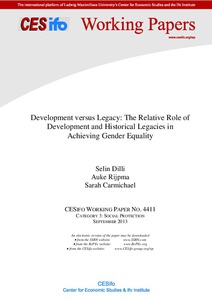Development versus legacy: the relative role of development and historical legacies in achieving gender equality
"Economic development is often held to be beneficial for gender equality. However, there is good reason to believe that long lasting institutions like religion, legal traditions, and family practices, also matter. This paper provides an empirical assessment of the relative importance of develop...
| Main Authors: | , , |
|---|---|
| Institution: | ETUI-European Trade Union Institute |
| Format: | TEXT |
| Language: | English |
| Published: |
Munich
2013
CESifo |
| Subjects: | |
| Online Access: | https://www.labourline.org/KENTIKA-19122763124919409459-Development-versus-legacy-the-.htm |
| Summary: | "Economic development is often held to be beneficial for gender equality. However, there is good reason to believe that long lasting institutions like religion, legal traditions, and family practices, also matter. This paper provides an empirical assessment of the relative importance of development and historical determinants of gender equality at the cross-national level. To capture this long-term relationship, a new index of gender equality that stretches back to 1960 is introduced. Besides data on legal and religious traditions of countries, we also employ lesser known data on family systems in the analysis of the index. We find that variables on the long lasting institutions of countries can be as important as economic development in determining gender equality outcomes. Thus, our study highlights the importance of considering the contextual and historical conditions of a country when analysing the determinants of gender equality gaps." |
|---|---|
| Physical Description: | 30 p. Digital |

